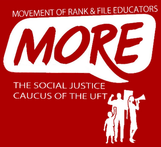This move is not wholly surprising since the recent appointment of the new School Reform Commission chair, Bill Green. Notorious for his more bull-headed approach in these matters, Green fully supports the decision and believes it will help the dwindling number of students in Philadelphia public schools.
In the meantime the Philadelphia Federation of Teachers, the teacher's union in the city, explained how these efforts put contract negotiations thoroughly behind. The contract that expired in August 2013 has been continued to a point thus far but seemingly will be bulldozed come September 2014. The new Caucus of Working Educators put out a statement of its own, explaining how teachers will be less likely to take risks that will help students if administrators have free reign and control over their teachers.
It is truly unfortunate that a budget crisis is cause for separation and in-fighting. Instead of attacking each other, what if the SRC and the PFT were to work together on a mutual solution. The contract might be one way of doing that but right now it seems like there are other hands at work, guiding some of the decisions of the District leadership. Recently the Philadelphia School Partnership - a private, corporate-mind driven organization - organized $2.6 million in grants to local schools, one of which will go to the creation of a new public school in the city. While they mean well - and I actually know and like some of the people involved in its creation - it seems poorly timed that a new school would embody the Phoenix metaphor so clearly.
In my time thus far in New York, it is difficult to watch the pendulum swing in the opposite direction as I feel a sense of emotional vacillation. Our new Chancellor and Mayor seem so focused on the idea of public schooling yet back in my hometown the corporate reformers are getting ready to gut the city school system. I can only hope something radical happens soon to push things back in the other direction.





 RSS Feed
RSS Feed
